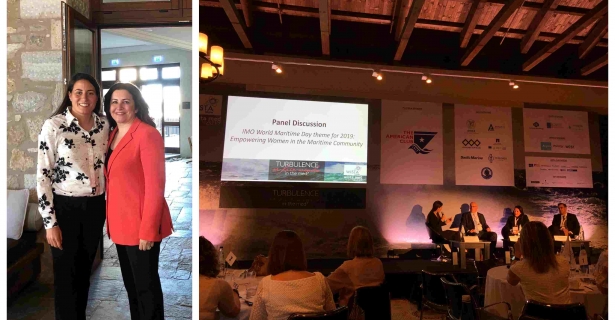This summer, I am spending three weeks in Greece conducting research to help in the creation of a maritime-centered, youth non-profit. The goal of the non-profit is to raise awareness about the industry, while finding roles for youth and young professionals to become more involved and empowered. During my time in Greece, I am interviewing various Greek shipowners, graduate students, and maritime professionals to gather data on ways that youth, ages fifteen to thirty, can become more engaged and involved in the maritime community. To date, I have had the opportunity to attend several maritime networking events, including a Mediterranean shipping conference located two hours outside of Athens, in Costa Navarino. The conference provided a unique opportunity to interact with similar participants who share a passion for the maritime industry. The conference discussed the importance of increasing maritime awareness, diversity, and the changing seascape surrounding the future of the industry. I participated in discussions with female shipowners from Greece, Cyprus, Turkey, and Lebanon.
At the Mediterranean shipping conference, I also had the honor of meeting Ms. Şadan Kaptanoğlu, the newly elected president of BIMCO (Baltic and International Maritime Council). BIMCO is the world’s largest ship owner’s association with more than 2,100 members and works with international organizations to advocate among global regulators. I enjoyed Ms. Kaptanoğlu’s presentation during a panel discussion entitled “Challenges and Opportunities in the Mediterranean.” Ms. Kaptanoğlu discussed BIMCO and the insight that the organization offers including articles, publications and Q&A on pressing topics, such as the 2020 Sulfur Cap. Kaptanoğlu talked about how if all of the ships worldwide were combined, the greenhouse gas (GHG) emissions would rank 6th among emission producing nations. She discussed ways to reduce GHG including slow steaming, ship design changes, innovation and alternative fuels. I will certainly be checking the BIMCO website more often for useful technical reports and market trends.As the conference continued, I was extremely impressed with the diverse array of moderators and panelists who brought their ideas about engagement to this year’s International Maritime Organization and its theme of “Empowering Women in the Maritime Community.” Since women represent no more than two percent of seafarers, it is increasingly important to raise awareness about the industry to youth, aid in access to maritime education for girls, encourage the industry to diversify its workforce, and ensure that governmental and international organizations have a policy development process that is consultative, participatory, and inclusive for all relevant stakeholders. At the conclusion of the three-day conference, the need for the creation of a youth centered, non-profit seemed more pressing than ever.
I hope this project will lead me to become a social entrepreneur. My next stop from Athens is Rhodes, Greece, where I will be meeting with graduate students from the Aegean Institute of the Law of the Sea and Maritime Law, as well as other Greek maritime industry professionals.

